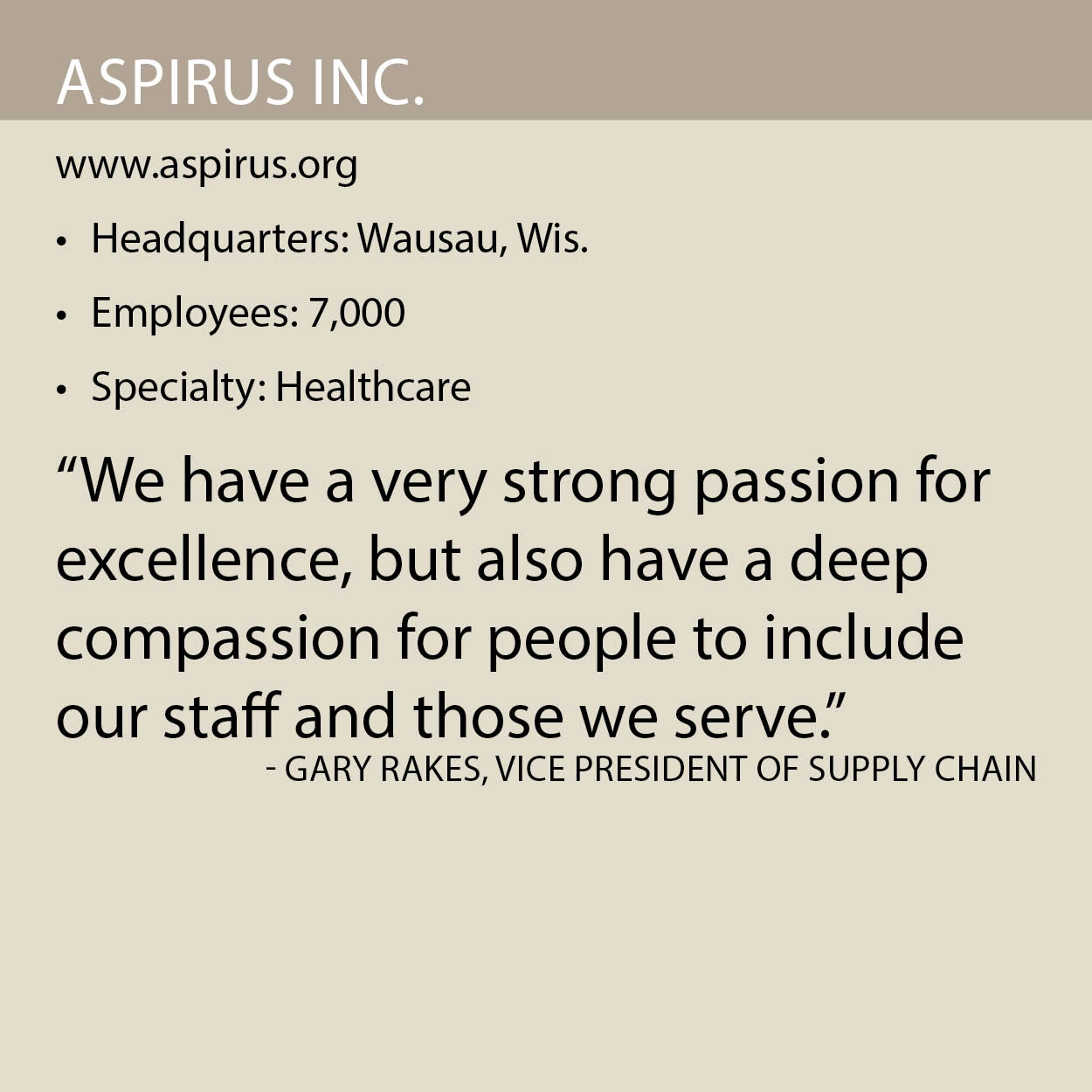Aspirus Inc.
Aspirus’ head of supply chain has modernized the company’s systems and cut costs.
By Chris Kelsch
Like many healthcare systems throughout the United States, Aspirus has met some very strong headwinds in recent years. Chief among these is managing the ever-increasing cost of medical devices, pharmaceuticals and capital equipment, while still trying to manage better outcomes for its patients.
“Medical products are getting more expensive, and reimbursements keep getting lower and lower,” says Gary Rakes, vice president of supply chain. “In addition to that, the aging of baby boomers and their increasing demand for healthcare services continues to add stress to all health systems.”
Managing those challenges is exactly why Rakes joined the Aspirus team. He was brought onboard 15 months ago to help reduce costs and modernize Aspirus’ supply chain system. “We’re on a three- to five-year journey,” Rakes says. “But so far, the results have been very positive.”

Modernization
Rakes’ transformation journey has resulted in an organization structure that centers on three core functional areas. The first is operations and logistics, or the “nuts and bolts” of supply chain, which also includes distribution. The second is strategic sourcing, purchasing and value analysis.
The third is information systems, which allows Rakes to utilize business intelligence and informatics to make better supply chain decisions. “Essentially, we have been moving from a transactional-based supply chain organization to a more strategic one,” he says.
Rakes has added technology where needed, and the results have been noticeable. “We have tools and technology that has helped us in a couple of ways,” he states. “The first is that it gives us better visibility into market pricing, and the second is that it allows us to see consumption data that promotes better standardization and utilization of the products we use throughout our health system, which creates the opportunity to provide a more positive outcome and experience for our patients.”
Aspirus is also a member of a regional purchasing coalition along with 64 other health systems. “By maximizing our contract portfolio with this coalition, the results have been significant and impressive,” Rakes says. “Not only has it led to much lower pricing for Aspirus and the other members of the group, but our vendor partners appreciate the value it brings to them as well. The contracting group is able to bring a specific level of commitment to a particular contracted vendor, giving our business partners some security with aggregated committed volume over a period of time, as typical contracts are multi-year in length.”
As noted, Aspirus has subscribed to certain technology tools that have enhanced its overall supply chain performance. One of those is a pricing comparison and analysis application, which has allowed Rakes’ sourcing team to identify numerous contract opportunities, lowering the overall pricing on the products they have acquired.
The second tool is a data-cleansing platform. According to Rakes this has significantly improved item master data accuracy, as well as reduced the number of purchasing related discrepancies. “This makes our supply chain less costly, less wasteful and more efficient,” Rakes notes.
Strong Results
So far, the results have been positive. Aspirus’ price indices and other supply chain performance indicators have been reduced significantly, and Rakes has systematized a model that works for all eight of its hospitals, as well as its more than 50 clinics and ambulatory care facilities. The end result: more focus, effort and resources can be devoted to providing the best possible quality care for their patients.
That is a significant boost for a healthcare system such as Aspirus. The company is one of the top healthcare providers in the United States, with two of its 6 critical access hospitals ranked within the top 20 critical access hospitals nationwide, and its largest hospital has received multi-year designation as one of the top 50 heart hospitals nationally.
Rakes notes that is by design. “We have a very strong passion for excellence, but also have a deep compassion for people to include our staff and those we serve,” he says.
That compassion extends to all geographic areas in which Aspirus operates: Wisconsin and the Upper Peninsula of Michigan. Rural areas are known for having physician shortages, so Aspirus has started the “Aspirus Scholars Program,” which is designed to attract physicians to its markets. It offers scholarships to medical students and other physician extenders in exchange for a pledge to stay in the area for a defined period of time and practice medicine at an Aspirus facility.
For Rakes, being at the midpoint of a three- to five-year process hasn’t diminished his enthusiasm. He has brought more than 34 years of experience to the position, including 20 years with the Navy Medical Service Corps. He oversees a staff of 100, and considers promoting his people’s growth part of his mission.
“Right now, we’re in the position of trying to create downstream leaders,” Rakes says. “We’re looking for people who can grow in their positions and become leaders.”
While training the supply chain leaders of tomorrow, Rakes takes tremendous pride in working for Aspirus because it is embedded deeply in each community it serves. “I am extremely proud to live in a community that really embraces Aspirus,” Rakes says. “People consistently tell wonderful stories of the impact an Aspirus facility or doctor has had on them or their family.”
As for his current supply chain team, Rakes is equally pleased. “I could not be more proud of my supply chain team and what they have been able to accomplish so far and the passion they possess in serving our caregivers and patients,” he says. And it fits right in with his team’s motto of “We fill the hands that heal.”